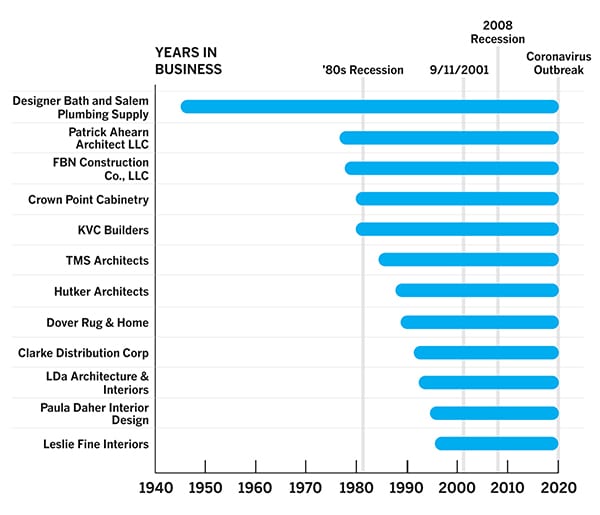COVID-19 Response: Bob Ernst, President, FBN Construction
April 29, 2020
We check in with twelve architects, builders, designers, and suppliers to see how they are managing their staff and their businesses during this incredibly challenging time.

With the coronavirus currently taking over our personal and professional lives, the measures that have been instituted to stop its spread have had a major impact on most businesses, including those of us serving the New England design industry. In times of crisis, we turn to people who have withstood similar circumstances in the past and persevered. We reached out to twelve industry leaders who have led their firms through past crises to share what actions they are taking now, how they will measure the success of their firms over the next twelve months, and how they’re moving forward.
Bob Ernst of FBN Construction shares how he and his team are working safely and moving their client’s construction projects ahead during the COVID-19 crisis.
How are you communicating with your in-house teams and outside vendors?
We still have some teams working, and I am making a point of visiting job sites to see employees and subs and witness the safety protocols’ observance and diligence. We want them to know it matters and is imperative if we are going to keep them working.
The team has also been having a Friday “Zoom Happy Hour” for everyone to get together virtually and decompress.
How will you be defining success in three months, six months, a year?
I think in all cases it will be about having our wonderful team intact and healthy, physically, and spiritually. A year from now, having all our clients feel as if we have worked diligently and thoughtfully within the parameters that have been imposed, and to feel that we have cared for them and the opportunities they have provided us in a safe and respectful way.
Is there something you implemented at your firm in 2008 that worked that you are executing again?
Building forecasting models for financial considerations so we are prepared for decisions that may need to be made, and able to do so with reason and consideration as opposed to panic or fear. Having working capital at hand is imperative as there will be unexpected issues that arise that can make a big difference to the future of the company. We need to protect our ability to handle them properly and expect the unexpected.
How are you thinking about cash flow management differently now than in more normal times? Are there different cost-saving strategies you are leaning on regarding staff, overhead, and discretionary spending?
Definitely being more careful about “discretionary” spending, and erring on the side of caution when making decisions to preserve working capital as we progress through this.
How do you ensure your “all of a sudden” remote workforce remains motivated and productive?
We have stayed in touch through emails throughout the week with informative updates, helpful, and even sometimes funny direct messages. We have also have made a point of reaching out by phone periodically just to ask how they are doing. We are a tight-knit group and communication flows pretty naturally, especially during difficult times. Transparency and authenticity as always help keep messaging on point.
Bob shared with us the memo he has sent to his entire team:
This “Novel Corona Virus” has created the need for novel, creative and timely approaches to business decisions and communication. I have been through 3 major recessions, as well as the 9/11 disaster, amongst other impactful economic and societal deviations, while running my business. Most notably I remember the fear and near panic of the 2008 Great Recession. This event has a very different feel, although some strategies that were useful to get through the last few are necessary now. We must have eyes wide open and alert, recognizing that some critical business decisions need to be made in very real-time. Remembering that “hope is the absence of faith” and critical business decisions shouldn’t be made on hope. Some of these decisions will be hard and will have an impact on people, and need to be made anyway, in the most human way possible. Any other approach risks affecting many more, team members, clients and trade partners in a much more significant way.
With recessions we don’t know how long or how deep but we kind of know what it will look like when we begin to emerge. This feels like 9/11 in that it is something we have never dealt with before and it seems as though this will change things forever, in ways that are markedly different, then the way a typical recession changes the marketplace.
We made a decision as a company to honor Governor Baker and Mayor Walsh’s restrictions and guidelines. We shut down 5 jobs that were started in Boston and have kept 4 of our suburban jobs going under specific directions and protocols in regards to safety procedures related to the current situation. We have jobs that we could continue working on, according to guidelines, but didn’t deem them able to continue, due to the specific nature of the project and whether we could maintain the necessary protocols. This would be irresponsible to our team and in general to the spirit of cooperation, necessary at this time.
We came to this decision after a great deal of discussion about the following:
- Paramount was, do we think we can operate safely?
- We have employees that WANT to work.
- Do those that want to work understand the situation and agree to be diligent?
- Do our clients want/need us to continue?
- Can we monitor the jobs adequately to ensure compliance and LIMIT the risk?
We have allowed any employee that is uncomfortable for any reason to request a furlough and honored that with no negative ramifications or implications, to their future here at our Company. We have honored for the most part the request of employees who would prefer to keep working, at least on the field side of things. As we have reduced field labor (cost of goods sold) we have been forced to make some layoffs of production management and office personnel so as to minimize that impact on the company and our ability to remain in a good position to emerge from this situation. We have jobs where our clients are sequestered and have no kitchen facilities, or space to spread out because of the status of the job when shelter in place became necessary. We also have clients that are temporarily out of their homes and must return by a specific date so we need the work to progress if possible.
For those projects that are continuing we have made it clear that the protocols are of critical importance in allowing the jobs to continue. We have been very strict about sanitary setup, compliance and procedures. We have been fortunate enough to be able to stock those jobs with the necessary materials and are conducting random daily checks on sites to ensure that these mandates are being followed.
These mandates include:
- Workspace separation
- Minimizing crew sizes
- Reducing the number of trades on-site at any one time
- Signage at entrances
- Sanitizing Stations at entrances
- No working together
- MINIMUM 6’ separation
- No common workstation (table saws, chop saws, etc.)
- Ideal work on separate floors or at least separate rooms when possible
- Wipes and Sanitizer as well as disposal at entrances
- Supervision and adherence of protocols by subcontractors on site
- Utilize daily report of job site conditions and experience: attached (eff. 4/6)
- Masks to be worn by all on-site (eff. 4/6)
By enacting these procedures and taking these steps we believe we can manage the health of our team, the concerns of our clients, and the fiscal health of our company for this period and for the time being. In addition, we feel we are being responsible and diligent in our community and operating with a net positive impact on our society.
Of course, we don’t know what is next and how that might change this dynamic. We have ongoing expenses that are due regardless of whether we are on sites or not (good practice to understand discretionary spending). Going to zero revenue would have an immediate impact on the Balance Sheet although fortunately we are in a healthy place to enter into this situation, and could manage through potential changes to the current plan, with critical decision making. Furthermore, there is the lost opportunity and revenues that will show up in the annual P and L which we will never be able to recoup.
We have work committed for a portion of the remainder of the year but still would need more to fill it out and bring everyone back for longer than the jobs we have running, and which will restart or commence once it is considered safe. We have a number of prospects and are currently confident in our ability to do so. This is where the crux of the issue lies, differently, here. If this was a typical recession, we would be able to know what we have, when it will end and understand how to “sell into” and make critical adjustments for the for-see-able future, based upon the current and projected 6-12-month outlook. We could then expect a “return to normal” and make decisions consistent with that eventuality. Historical models and logical prognostication can guide those decisions. Here of course, we are in unprecedented turmoil with little ability to understand the profound effect this may have on our business and in fact the way we do business in the immediate future and onward.
We are working on a week by week basis on how to proceed. Developing alternate scenarios and possible “maneuvers” to be prepared as the landscape changes. Some things that affect us, will be beyond our control. We must remain nimble and lean, vigilant, and aware. In this it is familiar, but that’s where it ends. It’s the unknown and the fear which can be exhausting if you focus on it, and who can’t from time to time. The responsibility we have though is to maintain our composure and level-headed critical thinking to make the best moves with the information at hand for our people, our clients, and our company.
Share
![NEH-Logo_Black[1] NEH-Logo_Black[1]](https://b2915716.smushcdn.com/2915716/wp-content/uploads/2022/08/NEH-Logo_Black1-300x162.jpg?lossy=1&strip=1&webp=1)








You must be logged in to post a comment.